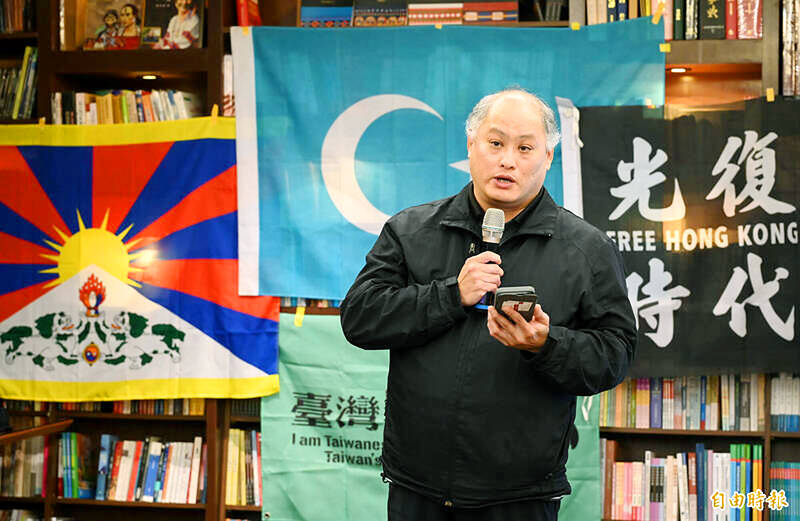Taiwan should reach out to countries that have extradition treaties with China or Hong Kong to prevent the handover of Taiwanese accused of “separatism” or other political crimes by Beijing, human rights activist Lee Ming-che (李明哲) said.
Lee, who was imprisoned in China from 2017 to April this year on a charge of subverting state power, was speaking at a news conference in Taipei to mark Human Rights Day. The event was hosted by Tibetan and Uighur groups, and the “Safeguard Defenders.”
During his incarceration, Lee met several Taiwanese who were imprisoned after being extradited from Spain in connection with telecom fraud, he said, adding that similar extraditions had been granted by Kenya and Malaysia.

Photo: Liu Hsin-de, Taipei Times
These extraditions went against a tacit understanding between Taipei and Beijing that Taiwanese would be repatriated to Taiwan for trial under the Cross-Strait Joint Crime-Fighting and Judicial Mutual Assistance Agreement (海峽兩岸共同打擊犯罪及司法互助協議) signed in 2009, he said.
Beijing’s demand that foreign countries extradite Taiwanese to China compromises the national sovereignty of Taiwan and the extradited individuals’ right to a fair trial and humane treatment in prison, he said.
Following US House of Representatives Speaker Nancy Pelosi’s visit to Taipei in August, China has ramped up pressure on Taiwan, including by authorizing criminal proceedings against pro-independence Taiwanese in absentia and without statutory limits, he said.
Citing an article by Chinese jurist Wang Yingjin (王英津) published in the state-run People’s Daily in August, Lee said that China could invoke mutual legal assistance treaties to target pro-independence Taiwanese in a third country.
That the paper carried the article suggests Beijing is seriously contemplating the strategy, which would endanger all Taiwanese transiting through China or traveling in a country that has an extradition treaty with Beijing, he said.
Lee urged the government to pre-empt China’s abuse of extradition treaties by taking up the issue via diplomatic channels and warning the public against traveling to countries that might comply with Beijing’s extradition requests.
Asked about a remark by Chinese Nationalist Party (KMT) Deputy Chairman Sean Lien (連勝文) that the 2024 presidential election is a choice between peace and war, Lee said that Taiwan would have to acquiesce to Beijing’s “one country, two systems” formula to obtain a guarantee of peace.
Taiwanese must decide if peace at the cost of concessions would be worthwhile, he added.
Separately, Lee said incumbent Taipei City Councilor Wang Hung-wei (王鴻薇) was a “disgrace to Taiwan’s national sovereignty” after she was accused of being a frequent guest on China Central Television’s political talk show Haixia Liangan (海峽兩岸).
Wang is running for the KMT in a legislative by-election for Taipei’s third electoral district.
She is one of many Taiwanese politicians who have appearead on a show that is no more than a propaganda segment for China’s “united front” work in Taiwan, Lee said.
Although Beijing is barred from directly controlling Taiwanese media, entrepreneurs who do business in China can be turned into its proxies, Lee said, adding that the public should be wary of media outlets run by figures with interests across the Taiwan Strait.

INVESTIGATION: The case is the latest instance of a DPP figure being implicated in an espionage network accused of allegedly leaking information to Chinese intelligence Democratic Progressive Party (DPP) member Ho Jen-chieh (何仁傑) was detained and held incommunicado yesterday on suspicion of spying for China during his tenure as assistant to then-minister of foreign affairs Joseph Wu (吳釗燮). The Taipei District Prosecutors’ Office said Ho was implicated during its investigation into alleged spying activities by former Presidential Office consultant Wu Shang-yu (吳尚雨). Prosecutors said there is reason to believe Ho breached the National Security Act (國家安全法) by leaking classified Ministry of Foreign Affairs information to Chinese intelligence. Following interrogation, prosecutors petitioned the Taipei District Court to detain Ho, citing concerns over potential collusion or tampering of evidence. The

Seventy percent of middle and elementary schools now conduct English classes entirely in English, the Ministry of Education said, as it encourages schools nationwide to adopt this practice Minister of Education (MOE) Cheng Ying-yao (鄭英耀) is scheduled to present a report on the government’s bilingual education policy to the Legislative Yuan’s Education and Culture Committee today. The report would outline strategies aimed at expanding access to education, reducing regional disparities and improving talent cultivation. Implementation of bilingual education policies has varied across local governments, occasionally drawing public criticism. For example, some schools have required teachers of non-English subjects to pass English proficiency

‘FORM OF PROTEST’: The German Institute Taipei said it was ‘shocked’ to see Nazi symbolism used in connection with political aims as it condemned the incident Sung Chien-liang (宋建樑), who led efforts to recall Democratic Progressive Party (DPP) Legislator Lee Kun-cheng (李坤城), was released on bail of NT$80,000 yesterday amid an outcry over a Nazi armband he wore to questioning the night before. Sung arrived at the New Taipei City District Prosecutors’ Office for questioning in a recall petition forgery case on Tuesday night wearing a red armband bearing a swastika, carrying a copy of Adolf Hitler’s Mein Kampf and giving a Nazi salute. Sung left the building at 1:15am without the armband and apparently covering the book with a coat. This is a serious international scandal and Chinese

TRADE: The premier pledged safeguards on ‘Made in Taiwan’ labeling, anti-dumping measures and stricter export controls to strengthen its position in trade talks Products labeled “made in Taiwan” must be genuinely made in Taiwan, Premier Cho Jung-tai (卓榮泰) said yesterday, vowing to enforce strict safeguards against “origin laundering” and initiate anti-dumping investigations to prevent China dumping its products in Taiwan. Cho made the remarks in a discussion session with representatives from industries in Kaohsiung. In response to the US government’s recent announcement of “reciprocal” tariffs on its trading partners, President William Lai (賴清德) and Cho last week began a series of consultations with industry leaders nationwide to gather feedback and address concerns. Taiwanese and US officials held a videoconference on Friday evening to discuss the